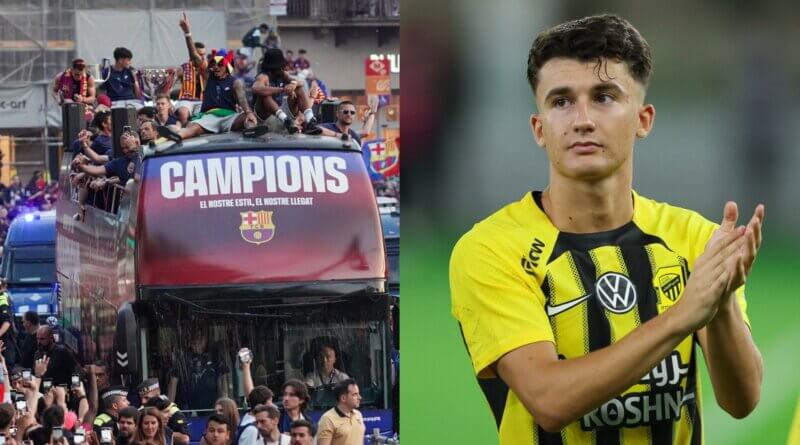Unai Hernandez Transfer: Why Barca’s Wonderkid Chose Al-Ittihad
Unai Hernandez transfer was sealed last summer with little fanfare, yet his decision to swap Barcelona’s famed La Masia for Saudi Arabian champions Al-Ittihad has quickly become one of the most talked-about moves of the year. At just 20, the Catalan midfielder has already lifted two trophies in Jeddah, and his confident claim that winning silverware in the Saudi Pro League is “a piece of cake” has raised eyebrows back in Spain.
Unai Hernandez transfer: Origins of a surprise exit
Born in Blanes and raised in Barcelona’s academy from the age of nine, Hernandez was tipped to follow the well-trodden path of Xavi and Iniesta. However, protracted contract talks stalled in early 2023. Barca’s wage cap squeeze, plus uncertainty over first-team minutes, left the youngster contemplating alternatives. When Al-Ittihad sporting director Ramón Planes—himself a former Barça executive—presented a five-year proposal featuring immediate senior football, a competitive salary and performance bonuses, the Unai Hernandez transfer gathered unstoppable momentum.
La Masia lessons packed for Saudi Arabia
Hernandez insists he owes his technical base to the Blaugrana’s possession mantra. “Football doesn’t end at Barcelona,” he told reporters. “You can carry the same principles anywhere.” The midfield metronome flew to Jeddah armed with La Masia’s positional play, rapid scanning and one-touch passing. Al-Ittihad coach Nuno Espírito Santo instantly installed him as a left-sided No. 8 in a 4-3-3, mirroring Barca’s shape and smoothing the adaptation.
From Camp Nou dreams to King Abdullah reality
The cultural shift was drastic: 100,000 fans at Camp Nou swapped for the rhythmic chants of 60,000 inside King Abdullah Sports City. Yet Hernandez says the passion feels equal. Teammates Karim Benzema, N’Golo Kanté and Fabinho offered guidance, while Spanish compatriots Álvaro Medrán and Jota introduced him to Saudi coffee rituals and post-training dips in the Red Sea. Crucially, the Unai Hernandez transfer allowed the youngster to train daily with Ballon d’Or winners—something Barca’s financial plight could not guarantee.
Silverware comes quickly in Saudi
Within nine months of the Unai Hernandez transfer, Al-Ittihad clinched the Saudi Super Cup and the Arab Club Champions Cup. Hernandez started both finals, completing 91% of his passes and earning rave reviews for dictating tempo under pressure. “Winning my first senior trophies felt natural,” he said. “At 20, I’m tasting success most players wait a decade for.”
Is the Saudi Pro League a ‘piece of cake’?
Critics argue Hernandez’s bold statement disrespects opponents, yet statistics back his confidence. He ranks first among U-23 midfielders for progressive passes and third for distance covered per 90 minutes. Still, he concedes the biggest difference lies in off-the-ball intensity: “In Spain pressing is collective, here it’s individual. That gives technicians like me a second more to choose the killer ball.”
Unai Hernandez transfer impact on Barcelona
Barca’s midfield depth forced coach Xavi to lean heavily on teenagers last season. Losing Hernandez reduced rotation options and prompted an emergency loan for Oriol Romeu. Club sources admit they underestimated Saudi ambition; the Unai Hernandez transfer served as a wake-up call that Middle Eastern clubs are now genuine competitors for Europe’s elite talent.
Financial facts behind the move
Al-Ittihad reportedly paid a €7 million training compensation fee—peanuts compared to Premier League norms but life-changing for the player. Hernandez’s salary, thought to be around €4 million net annually, dwarfs Barca’s entry-level offers. He also negotiated a 35% sell-on clause for Barcelona, softening criticism from supporters who felt betrayed.
Living and learning off the pitch
Life in Jeddah has been educational. Hernandez is taking Arabic classes, has hired a nutritionist to adjust to Gulf cuisine and frequently visits local grassroots academies to promote youth development. “I don’t want to be the guy who came, cashed in and left,” he emphasises. The Unai Hernandez transfer, he argues, is about broadening horizons as much as boosting his bank balance.
The road ahead after the Unai Hernandez transfer
With the AFC Champions League on the horizon, Hernandez has targeted continental glory next. Scouts from Serie A and the Bundesliga are already monitoring his progress, but he remains calm. “I signed five years because I believe in this project,” he says. “If Europe calls again, it will be when I’m a complete player.”
What it means for the growth of Saudi football
Hernandez’s journey embodies the Saudi Pro League’s aggressive push for relevance. Luring a La Masia graduate in his prime years signals strategic depth—not just the signing of ageing stars but the capture of future ones. If the Unai Hernandez transfer model succeeds, expect a growing pipeline of European academy talents seeking accelerated careers in the Gulf.
Opinion: A calculated leap that benefits all sides
From a neutral standpoint, the Unai Hernandez transfer looks like a win-win. Barcelona lighten their wage bill while retaining upside through the sell-on clause. Al-Ittihad secure a dynamic midfielder who instantly boosts their tactical variety. Most importantly, Hernandez himself gains minutes, money and medals. It may sting culés now, but in five years the youngster could return to Europe as a seasoned, trophy-laden professional—proof that football, indeed, doesn’t end at Barcelona.
Your global gateway to nonstop football coverage:
News Goal
Share this content:

